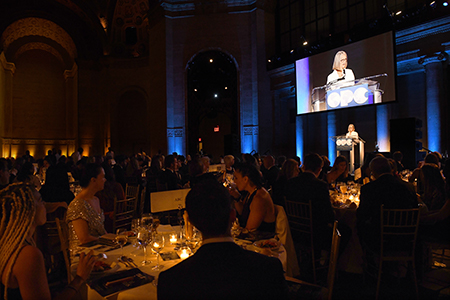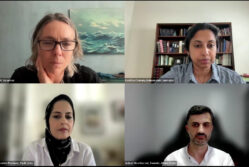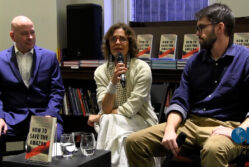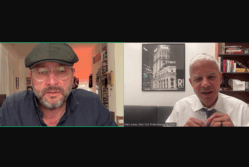Event Coverage Highlight

Awards Dinner Spotlights Exceptional International Reporting During COVID
 by J.p. Lawrence
by J.p. Lawrence
Foreign correspondents, proof of vaccination on hand, gathered to honor extraordinary reporting after two years of disruption gripped and fundamentally altered the world.
The OPC Annual Awards Dinner on Oct. 22 in lower Manhattan was the first in-person ceremony for the group since the coronavirus pandemic began last year.
The stories honored at the event came from journalists taking risks to report the truth during a pandemic and as authoritarian governments tightened restrictions on reporting, OPC President Paula Dwyer said.
“Our occupation has always been on a rough-and-tumble playing field, and most journalists are pretty tough skinned, but sadly it was harder and more life-threatening to practice our trade,” Dwyer said.
Stories ranged from Afghanistan to India, Mexico to Brazil, and Russia to China. Reporters covered historical events such as the end of the U.S. war in Afghanistan, the global pandemic, and human rights abuses across the world. Common themes include people displaced – by war and by climate change, and people confined – in prisons and in hospital beds.
The lives of Afghan women in a prison in western Afghanistan was the focus of Kiana Hayeri’s photography, in a project in The New York Times Magazine which claimed the Robert Capa Gold Medal Award for best photographic reporting from abroad requiring exceptional courage and enterprise.
The New York Times received three awards, marking the record 17th consecutive year that it has taken home at least one OPC award, a statement from OPC said in April.
Hayeri spent two weeks among the inmates, who paradoxically found more freedom and peace in prison than they had living with their abusive husbands. Since publishing the story, the conquering of Afghanistan by the hard-line Taliban after the pullout of foreign troops has placed those women at risk once more, Hayeri said.
“Today, millions of Afghan women have been put away in a larger prison, called Afghanistan,” Hayeri said in a video recording played at the event. “This is the consequence of an irresponsible withdrawal.”
She thanked the Afghan journalist who helped her gain access to the prison, Hamed Sarfarazi, who like many reporters fled his country to escape possible retribution from the Taliban.
Reporting by Andrew Quilty, an Australian freelancer, revealed the brutality of CIA-trained militias who terrorized civilians in rural Afghanistan prior to the fall of Kabul. His investigation for the Intercept earned the Hal Boyle Award for best newspaper, news service or digital reporting from abroad. The story came after dozens of trips into Taliban-controlled areas.
Like many others throughout the night, Quilty thanked sources who spoke to journalists, “those whose accounts and ordeals have contributed to the greater mission of holding to account the successive U.S. administrations on whose account these atrocities were carried out.”
Afghanistan was where Danish Siddiqui, Reuters chief photographer, died on July 11, 2021, while reporting on rising violence during the nation’s takeover by the Taliban. Siddiqui was embedded with Afghan commandos when he was killed.
The emotional wounds from his death are still fresh, said his wife, Rike Harrant, but she said she hopes her husband’s pictures and memory would inspire future reporters.
“Journalism was not merely his profession but his passion,” Harrant said. “Danish wanted to capture and show the world images that many would have rather avoided.”
Danish and Harrant’s two children lit a candle in his honor, in a recording that played at the dinner.
The event also honored reporting on the coronavirus pandemic, which gripped much of the world and killed more than 4.8 million people.
“I still vividly recall the first uncertain days after the outbreak in Wuhan,” said Dake Kang, journalist in the Associated Press’s Beijing bureau. Their reporting revealed how leaders in China held off on alerting the public about the danger posed by the virus, all but assuring the spread of COVID-19 worldwide.
“As the virus ripped through China and began spreading around the world, one question, above all, was key: how did this all begin?” said Kang, who earned the Roy Rowan Award for best investigative reporting on an international story.
Two other outlets received awards for documenting the pandemic. Nanna Heitmann photographed the ravages of COVID-19 in a hospital in Russia for National Geographic, winning the Olivier Rebbot Award. David Culver of CNN won the David Kaplan Award for reporting that included an interview with Chinese whistleblower Li Wenliang, a doctor who eventually died of the disease.
Reporting on China earned two other awards, with a BuzzFeed News team winning the Kim Wall Award for combining interviews with satellite images and 3D visualization to prove the existence of internment camps in Xinjiang, and Sarah Topol’s piece for The New York Times Magazine chronicling a Uighur family whose parents suddenly disappeared, winning the Ed Cunningham Award.
The displacement of people also proved an intense subject.
ProPublica’s Abrahm Lustgarten and photographer Meridith Kohut won the Whitman Bassow Award for reporting on the present and future impacts of migration due to climate change. The Washington Post reported about how colonialism and social media shape lives throughout West Africa, winning the Madeline Dane Ross Award. Latino USA earned the Lowell Thomas Award for producing a series on the Mexican government militarizing its border, blocking the movement of people from Central America.
The last two years also saw ample opportunity for uncovering institutional corruption in business and government. The Washington Post investigated narcotraffickers’ capture and control of states within Mexico, winning the Bob Considine Award; Bloomberg tracked ruthless government and business forces in Honduras, winning the Morton Frank Award; the Financial Times published a takedown of the fraudulent European fintech company Wirecard, winning the Malcolm Forbes Award; and The Wall Street Journal earned the David A. Andelman and Pamela Title Award for revealing government neglect in an investigation into a dam collapse in Brazil that killed 270 people.
The last five years have been a difficult time for press freedom, said the event’s keynote speaker, New York Times’ correspondent Maggie Haberman.
“As scary a time as this has been in so many ways, the stellar journalism that has emerged from it underscores not just why what we do is vital, but why the frequent criticism of how we do what we do has often lapsed into caricature,” Haberman said.
The night included a tribute to Christopher Dickey, a long-time Paris-based world news editor for Newsweek and the Daily Beast. Dickey received the OPC President’s Award posthumously.
“Christopher Dickey was the real deal you see, a journalist in full,” said Brian Williams, broadcast news anchor at MSNBC, in a video clip played at the event. “One of those great and curious storytellers who seem to know just about everything and everyone.”
Dickey died on July 16, 2020, after four decades covering news around the world, and mentoring countless journalists.
“As he saw it, love of country meant holding us to account, all of us,” Williams said.
Watch a recording of the Livestream via the window below.



